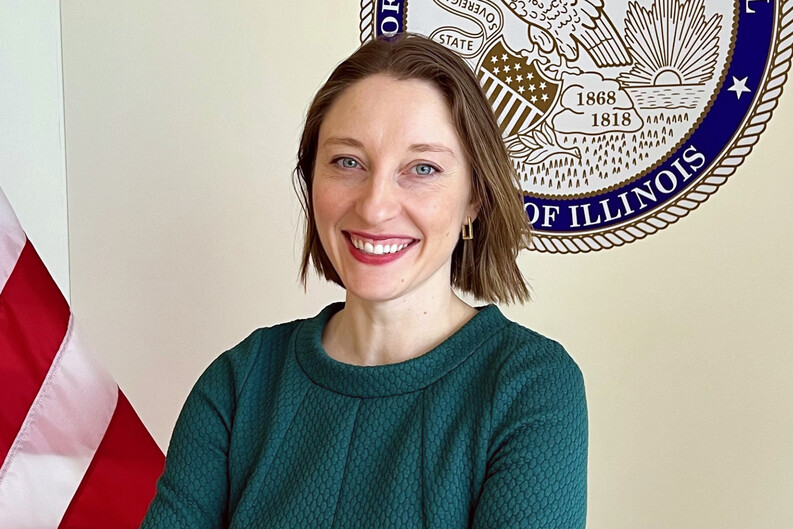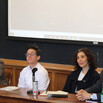Kathy Hunt Muse ’09 Tackles Gun Violence in Illinois

Kathy Hunt Muse ’09 heads the Office of the Illinois Attorney General’s efforts to combat gun violence. She joined the office in 2019 and is now Deputy Chief of the Public Interest Division. This is one chapter in Muse’s public interest law career, which began when she was a 2009-2010 Liman Fellow.
During her fellowship, Muse worked at the New York Civil Liberties Union, where she focused on the intersection of the school-to-prison pipeline and on policies to help students with special needs. Muse represented parents seeking educational services for their children, filing a class action behalf of students who were wrongfully arrested at school for minor infractions. Next, she clerked on the U.S. District Court for the Eastern District of Pennsylvania and honed her litigation skills at a private law firm while continuing to work on civil rights litigation pro bono.
In 2017, Muse returned to public interest lawyering full time when she joined the ACLU of Illinois as Special Litigation Counsel. Muse represented community groups and leaders seeking to reform law enforcement policies on use of force. She negotiated a landmark agreement that provided community groups with a direct and ongoing role in enforcing a consent decree against the Chicago Police Department. In this work, Muse collaborated with civil rights organization Muslim Advocates, working to bring transparency to government programs monitoring Muslims. She also worked with the National Immigrant Justice Center to challenge warrantless traffic stops and unlawful racial profiling used by U.S. Immigration and Customs Enforcement to arrest and detain people in the Chicago area.
She spoke with the Arthur Liman Center for Public Interest Law about her work today and what her Liman Fellowship taught her.
Why did you decide to leave private practice and return to full-time public interest in 2017?
As someone who went to law school with the intention of being a public interest lawyer, I was surprised to find myself in private practice for almost six years. I had joined a firm to get litigation skills I could eventually use at a public interest organization; I stayed as long as I did because I was fortunate to have great colleagues, clients, and pro bono opportunities. Still, I felt a deep responsibility to dedicate my work to addressing pressing societal needs full-time, so when the right opportunity arose, I took it.
What have you and your colleagues in the Illinois Attorney General’s Office been doing to combat gun violence in Illinois?
Attorney General Raoul has made it a priority to ensure his office uses all of its tools to combat gun violence. It has been a privilege for me to work with the many dedicated public servants in my office who bring different expertise to this problem. For example, some of my colleagues have trained thousands of police officers and constituents about our state’s firearms restraining order act (or “red flag” law), which provides a process to temporarily limit access to firearms when an individual poses an immediate danger to themselves or others. Because most lives lost to gun violence result from suicide, our office has taken an active role in educating the public and law enforcement about how this law can be used to keep loved ones safe.
My work focuses on civil litigation to further gun safety. When I joined the office over four years ago, I began convening cross-office meetings to facilitate a more coordinated approach to gun violence, including our defense of the state’s firearms laws. That infrastructure became critical when, in 2022, the Supreme Court issued its decision in New York State Rifle & Pistol Association v. Bruen, which upended the legal framework courts had been applying to Second Amendment claims. That court decision has generated a flood of litigation. Firearms business groups, firearms advocacy groups, and individuals across the country are challenging even long-standing and widely accepted regulations in court, and states are having to dig up colonial- and Reconstruction-era historical sources to defend modern laws in an uncertain and quickly evolving legal landscape.
What impact have you had in this area so far?
I’m grateful I’ve had the opportunity to defend the state’s restrictions on the sale and possession of assault weapons and large-capacity magazines. The law went into effect in Illinois just over a year ago and was immediately challenged in courts all over the state. My colleagues successfully defended against a set of state law challenges before the Illinois Supreme Court last year, while I have defended the law in federal courts. The litigation is ongoing, but the law has withstood initial challenges and is currently in effect.
I’ve also worked on successful affirmative initiatives to create accountability for bad actors in the gun industry that are contributing to the gun violence plaguing neighborhoods. For example, we sued to challenge the license of a gun manufacturer who had a history of selling to a gun trafficker and had otherwise violated federal laws. More recently, we spearheaded state legislation that created civil liability for gun industry members who violate the law.
What are your other areas of work?
As Deputy Chief of the Public Interest Division, I collaborate with attorneys in my division’s seven bureaus: antitrust, civil rights, disability rights, public utilities, special litigation, tobacco enforcement, and workplace rights. And, our office also responds to the needs of the day even when they don’t fit neatly into those categories. To that end, I worked on legal responses to COVID, and I work on reproductive rights and protecting lawful elections. I’ve also had the privilege of working on some of our most complex constitutional and preemption cases, such as our lawsuit seeking full recognition of the Equal Rights Amendment, and our defense of an Illinois law prohibiting local law enforcement from assisting in immigration enforcement.
The Liman Center helps build the problem-solving skills that new attorneys need to develop into public interest leaders.“
— Kathy Hunt Muse ’09
How is your experience as a Liman Fellow still relevant to your experience as a lawyer today?
My year as a Liman Fellow provided me with a foundation in constitutional litigation, affirmative litigation, police practices, and disability rights — all of which I draw on for my job today. But what was even more important than the substantive knowledge I gained was that the fellowship asked me to think about the different ways to tackle a complex problem, to spend time implementing those ideas, and then to see firsthand which ideas didn’t pan out and why. I learned to ask questions like: What are the pros and cons of using litigation rather than another approach to create impact or further this client’s goals? Are the right stakeholders involved for this approach to be successful? Those lessons were critical to learn early in my career.
As a mentor for other Liman fellows over the years, I’ve seen that my experience wasn’t unique. A vital part of the Liman program is how it gives recent law graduates the opportunity to think carefully about how their work can — or cannot — make a larger impact. Without such a fellowship, law graduates hired directly into organizations are asked to focus on discrete tasks and are not involved in crafting the larger vision. While that leads to important skills-building, often it can quash creative thinking in emerging public interest lawyers. The Liman Center helps build the problem-solving skills that new attorneys need to develop into public interest leaders.
What advice do you have for law students or working lawyers seeking a career in government service?
When you’re looking for the right career opportunity, be curious about the different government attorney roles available where you want to live and how government intersects with the issues you care about. Do you intend to practice in a state that passes laws you might want to help defend? Do you live in a city trying to implement a new approach, like reparations or the elimination of cash bail? Reach out to Yale Law alumni who work in different areas of government to ask what their day-to-day job looks like. State and local government offer many opportunities for creative thinkers to push up their sleeves and get to work helping to design, defend, enforce, and implement important laws to serve the public.


